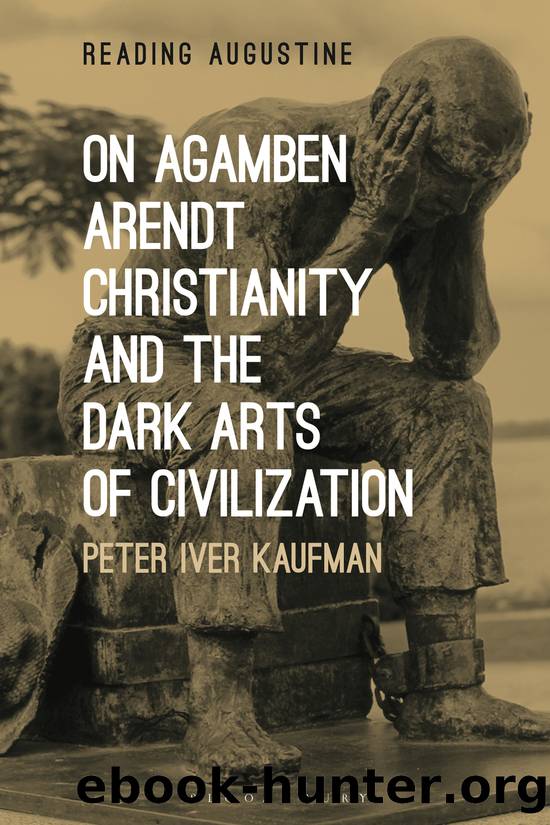On Agamben, Arendt, Christianity, and the Dark Arts of Civilization by Peter Iver Kaufman;

Author:Peter Iver Kaufman;
Language: eng
Format: epub
ISBN: 9780567682819
Publisher: Bloomsbury UK
3
Arendt’s Augustine
To Augustine and not to Augustine
Hannah Arendt wrote her doctoral dissertation on Augustine’s concept of love under the direction of Karl Jaspers, whom she later declared to have been the only person to have educated her.1 She exaggerated, and this final chapter explains why Augustine ought to be reserved a special place among the others from whom she drew ideas and inspiration. Arendt was critical of him, but it is difficult to deny that, as she pondered twentieth-century pariahs and poleis, he haunted her frustrations with the practice of politics and, arguably, her reflections on alternatives to the public realm, frustrations and reflections that have a tremendous bearing on how one might read Augustine as a radical. As disenchantment set in, as Arendt found that “action and speech,” “the highest activities in the political realm,” were undermined by bureaucracies, she questioned whether the public realm was the best place to reclaim “the potentiality which springs up between people when they come together in action and speech.”2
Arendt concluded her dissertation contemplating ever so briefly the social consequences of what she identified as Augustine’s estrangement (Entfremdung) from the political competition that glory hounds around him seemed to relish. He sometimes sounded forlorn, but Arendt noted that his recoil led him to advocate new sorts of cohorts alongside and, in some ways, opposed to prevailing political conduct and commercial protocols in late antiquity (ein neues Miteinander und Füreinander . . . neben und gegen).3 As we learned, he tried intermittently—and with a few partial successes—to organize unconventional, alternative poleis. But circumstances in Italy and, from the 390s, clerical commitments in Africa led him to scuttle several experiments. Setbacks in Rome, Milan, and Thagaste, though, did not deter him from retrying in Hippo—and from forming the conventual community that later impressed Agamben. Arendt chose not to write about those efforts, and at least one reviewer complained about that choice and about her neglect of her subject’s sources.4 But Arendt was not writing historical theology, and she cared little for the social history of late antiquity. Still, what she learned—and conveyed clearly at the end of her dissertation—was that Augustine harbored no hope for the renovation of Roman provincial or imperial government. He innovated, but Arendt held his innovations to have been unworldly and irresponsible until she began losing her faith in the possibility that the public realm would allow for forgiveness, tolerance, virtue, promise keeping, and new beginnings.
Her faith in the public realm had been tested soon after—and long after—she completed her dissertation in 1929. She watched as elites in Germany during the 1930s all but abandoned government in Germany to a tyrant and flattered his collaborators as they shaped their hideously hegemonic regime. Fascists there drove her into exile, eventually to the United States, where she wrote perceptively about intolerance in Europe. Arendt imagined that, in large part, intellectuals’ indifference to developments in beer halls and backrooms ceded the hearts and minds of German, Austrian, Italian, and Russian citizens to bullying despots.
Download
This site does not store any files on its server. We only index and link to content provided by other sites. Please contact the content providers to delete copyright contents if any and email us, we'll remove relevant links or contents immediately.
Changing the Questions: Explorations in Christian Ethics by Margaret Farley(821)
The Broken Image by Leanne Payne(723)
Money, Possessions, and Eternity by Randy Alcorn(675)
Reset the Heart by Tran Mai-Anh Le;(620)
Introducing Christian Ethics by Scott Rae(545)
The Year without a Purchase by Scott Dannemiller(528)
Introduction to Christian Ethics by Marshall Ellen Ott;(512)
Bioethics and the Christian Life: A Guide to Making Difficult Decisions by David VanDrunen(504)
Old Testament Ethics for the People of God by Wright Christopher J. H(501)
Wholly Different: Why I Chose Biblical Values Over Islamic Values by Darwish Nonie(493)
A Doubter's Guide to the Ten Commandments: How, for Better or Worse, Our Ideas about the Good Life Come from Moses and Jesus by John Dickson(454)
A Theologico-Political Treatise, and A Political Treatise by Benedict de Spinoza(446)
How to Keep From Losing Your Mind by Deal Hudson(441)
Be the Bridge by LaTasha Morrison & Daniel Hill & Jennie Allen(423)
The Spiritual Danger of Donald Trump: 30 Evangelical Christians on Justice, Truth, and Moral Integrity by Ronald J. Sider(407)
I Bring the Voices of My People by Chanequa Walker-Barnes(405)
Managing God's Mutual Funds by Kenneth Copeland(392)
Divine Covenants and Moral Order (Emory University Studies in Law and Religion) by David VanDrunen(392)
A Serious Way of Wondering by Reynolds Price(380)
